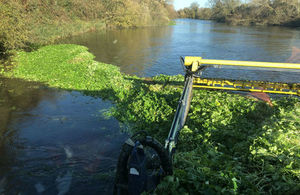Report floating pennywort this winter, says Environment Agency
Reminder issued after EA removes 1,000 tonnes of the invasive species from the Anglian region’s rivers

The Environment Agency has been removing floating pennywort, an invasive species, from rivers
Not all greenery is festive – that’s the reminder from the Environment Agency this Christmas, after teams have removed more than 1,000 tonnes of highly-invasive floating pennywort from river networks in the Anglian region.
More than 500 tonnes were removed from the Bedford Ouse, 400 tonnes from the River Cam, and 200 tonnes from the Ely Ouse.
The teams have also tackled 50 new patches that appeared this year on the River Witham between Lincoln and Chapel Hill.
It’s part of a sustained attack on the non-native species this winter that sees the EA working with partners, contractors, local communities and volunteer groups to clear the plant – even by hand, when necessary.
Floating pennywort forms dense mats that can affect oxygen levels in the water, crowd and kill off native wildlife, and damage habitat. It can become so prolific that boaters, anglers and others can’t use the waterway, and it even clogs sluices, weirs and drains, potentially increasing flood risk.
The plant is notoriously difficult to control – it can grow up to 25cm a day in the right conditions and even a small fragment can re-grow into a new plant.
But the Environment Agency is continuing to battle the weed this winter. On the Great Ouse, teams with weedboats are harvesting and removing the pennywort onto the banks, where it can compost down safely and naturally.
Volunteers from local fishing, canoeing and boating groups are also chipping in by removing rafts of the weed with their hands, nets and bin bags.
Removal efforts will continue into the spring, and the Environment Agency is appealing to anglers, boaters and others who spend time on or near the water to report any patches they see – and to take precautions to avoid spreading it.
Paul Separovic, team leader at the Environment Agency said:
Floating pennywort can cause damage to our natural habitat, threaten our native ecology, and prevent people from enjoying pastimes that bring them closer to nature, like fishing, boating and canoeing.
That’s why we’re reminding people to help us stop the spread of this aquatic invader – make sure to check, clean and dry your clothes and equipment thoroughly after being in the water, and report sightings to us on 0800 80 70 60.
We’d like to thank our partner organisations, local communities, and especially the dedicated volunteers who go out of their way to help with removing the weed.
If we all do our parts, we can help protect our natural environment for people and wildlife into the future.
Environment Agency officers’ long-term plan of attack involves working methodically down the rivers to clear the weed, and revisiting and double-checking previously cleared stretches. As well as advancing the frontline, the teams also tidy up riverbanks so there’s less for the floating pennywort to cling to, which will help reduce its spread.
Learn more about invasive species – and how you can help stop the spread – on the Non-native Species Secretariat’s website.
Top tips for preventing the spread of floating pennywort:
- Learn what to look out for
- Check yourself, your clothing, and any equipment that has been on or in the water
- Thoroughly clean and remove any suspected specimens, leaving them at the site where they came from – preferably out of the water and on the banks
- Report sightings to the Environment Agency’s 24/7 hotline: 0800 80 70 60
- Dry your equipment thoroughly and well before re-launching it or using it again